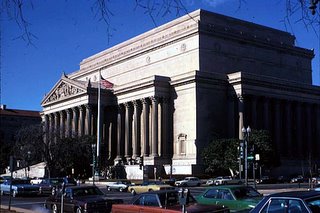Tuesday, February 21, 2006
Intelligence Agencies Reclassifying Old Papers at National Archives

In what can be described as charitably as possible as trying to put the genie back in the bottle:
(I)ntelligence agencies have been removing from public access thousands of historical documents that were available for years, including some already published by the State Department and others photocopied years ago by private historians.
The restoration of classified status to more than 55,000 previously declassified pages began in 1999, when the Central Intelligence Agency and five other agencies objected to what they saw as a hasty release of sensitive information after a 1995 declassification order signed by President Bill Clinton. It accelerated after the Bush administration took office and especially after the 2001 terrorist attacks, according to archives records.
Most of this stuff is ancient:
But because the reclassification program is itself shrouded in secrecy, — governed by a still-classified memorandum that prohibits the National Archives even from saying which agencies are involved, — it continued virtually without outside notice until December. That was when an intelligence historian, Matthew M. Aid, noticed that dozens of documents he had copied years ago had been withdrawn from the archives' open shelves.Mr. Aid was struck by what seemed to him the innocuous contents of the documents, mostly decades-old State Department reports from the Korean War and the early cold war. He found that eight reclassified documents had been previously published in the State Department's history series, "Foreign Relations of the United States."
"The stuff they pulled should never have been removed," he said. "Some of it is mundane, and some of it is outright ridiculous."...
Among the 50 withdrawn documents that Mr. Aid found in his own files is a 1948 memorandum on a C.I.A. scheme to float balloons over countries behind the Iron Curtain and drop propaganda leaflets. It was reclassified in 2001 even though it had been published by the State Department in 1996.
Another historian, William Burr, found a dozen documents he had copied years ago whose reclassification he considers "silly," including a 1962 telegram from George F. Kennan, then ambassador to Yugoslavia, containing an English translation of a Belgrade newspaper article on China's nuclear weapons program.
Under existing guidelines, government documents are supposed to be declassified after 25 years unless there is particular reason to keep them secret. While some of the choices made by the security reviewers at the archives are baffling, others seem guided by an old bureaucratic reflex: to cover up embarrassments, even if they occurred a half-century ago.One reclassified document in Mr. Aid's files, for instance, gives the C.I.A.'s assessment on Oct. 12, 1950, that Chinese intervention in the Korean War was "not probable in 1950." Just two weeks later, on Oct. 27, some 300,000 Chinese troops crossed into Korea.
I find it impossible to imagine that the CIA's Security Operations Center, the office that investigates security violations, would have had any objection at this late date to having those fossilized documents in the open at the National Archives.


